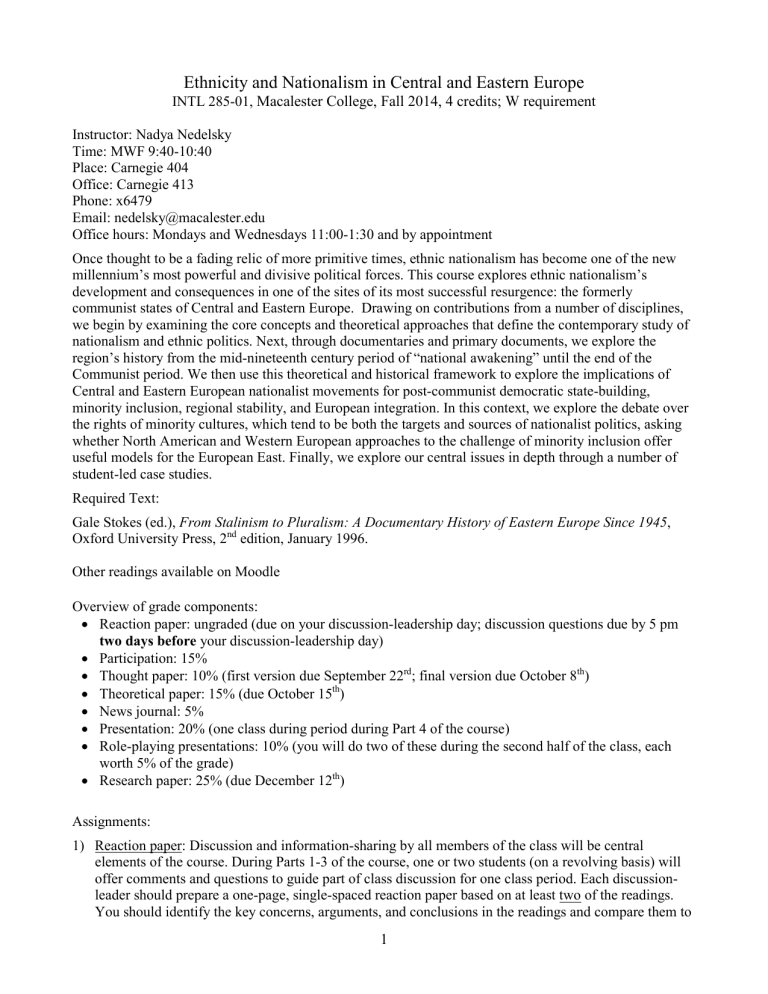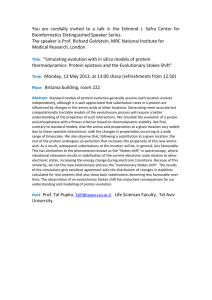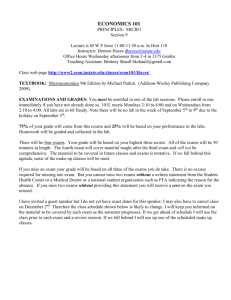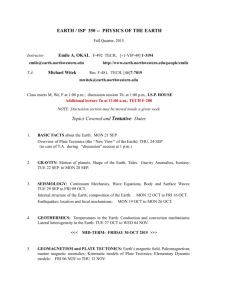Ethnicity and Nationalism in Central and Eastern Europe (INTL 285

Ethnicity and Nationalism in Central and Eastern Europe
INTL 285-01,
Macalester College, Fall 2014, 4 credits; W requirement
Instructor: Nadya Nedelsky
Time: MWF 9:40-10:40
Place: Carnegie 404
Office: Carnegie 413
Phone: x6479
Email: nedelsky@macalester.edu
Office hours: Mondays and Wednesdays 11:00-1:30 and by appointment
Once thought to be a fading relic of more primitive times, ethnic nationalism has become one of the new millennium’s most powerful and divisive political forces. This course explores ethnic nationalism’s development and consequences in one of the sites of its most successful resurgence: the formerly communist states of Central and Eastern Europe. Drawing on contributions from a number of disciplines, we begin by examining the core concepts and theoretical approaches that define the contemporary study of nationalism and ethnic politics. Next, through documentaries and primary documents, we explore the region’s history from the mid-nineteenth century period of “national awakening” until the end of the
Communist period. We then use this theoretical and historical framework to explore the implications of
Central and Eastern European nationalist movements for post-communist democratic state-building, minority inclusion, regional stability, and European integration. In this context, we explore the debate over the rights of minority cultures, which tend to be both the targets and sources of nationalist politics, asking whether North American and Western European approaches to the challenge of minority inclusion offer useful models for the European East. Finally, we explore our central issues in depth through a number of student-led case studies.
Required Text:
Gale Stokes (ed.), From Stalinism to Pluralism: A Documentary History of Eastern Europe Since 1945 ,
Oxford University Press, 2 nd
edition, January 1996.
Other readings available on Moodle
Overview of grade components
:
•
Reaction paper: ungraded (due on your discussion-leadership day; discussion questions due by 5 pm two days before your discussion-leadership day)
•
Participation: 15%
•
Thought paper: 10% (first version due September 22 rd
; final version due October 8 th
)
•
Theoretical paper: 15% (due October 15 th
)
•
News journal: 5%
•
Presentation: 20% (one class during period during Part 4 of the course)
•
Role-playing presentations: 10% (you will do two of these during the second half of the class, each worth 5% of the grade)
•
Research paper: 25% (due December 12 th
)
Assignments:
1) Reaction paper: Discussion and information-sharing by all members of the class will be central elements of the course. During Parts 1-3 of the course, one or two students (on a revolving basis) will offer comments and questions to guide part of class discussion for one class period. Each discussionleader should prepare a one-page, single-spaced reaction paper based on at least two of the readings.
You should identify the key concerns, arguments, and conclusions in the readings and compare them to
1
one another. Your primary task, however, is to react to the readings rather than to summarize them.
Based on this reaction, you should offer two questions for discussion. You should e-mail these to me by
5 pm two days before your discussion-leadership day, so that I can work them into the class design and email some questions out, so your classmates have time to think about them. The reaction paper itself is due in class on the day of your discussion-leadership. It is ungraded but will count toward your participation grade.
2) Participation in class discussions will be worth 15% of the grade. If you feel uncomfortable speaking in class, please meet with me and we can discuss ways to make this easier for you.
3) Thought paper: One component of the W requirement is the opportunity to revise a piece of writing, which you will be able to do with the 2-page thought paper. You will respond to a prompt I provide and follow the format I will explain. I will hand it back to you with comments, which will provide you basis for revisions. The first version is due September 22 rd
and the final version is due October 8 th
. Worth
10% of the grade.
4) Theoretical paper: In this course, each student will develop an expertise on nationalism in one formerly communist European country. This and three of the following course assignments are designed both to help you develop in-depth knowledge and to allow you to share the benefits of your expertise with the class. The first of these interrelated assignments is to write a double-spaced, six-to-eight page paper in which you will categorize five scholarly texts on your country (articles or book chapters; you may include the readings for your case assigned in this syllabus if they are useful) according to the theoretical approach(es) to the study of nationalism that they use. You should support your categorizations with evidence from the texts and with reference to the theoretical literature on nationalism introduced in the first weeks of the course. Worth 15%. Due Monday, Oct 13th.
5) News journal: Beginning in the third week of class, you should start following the news in your country
(various regional news digests are available online). By Friday of each week, you should send me a link to an important news story from your country, accompanied by 2-3 questions it raises for you. Worth
5%.
5) Presentation:
You will give a 15-minute presentation to the class on your case study during the second half of the course, on the day that we focus on your region.
At its core, the paper should take up these questions:
What nationalism-related issues are important in your country, and with what implications?
What are the root causes of these issues, and which theory or theories best help us understand/explain them? How does your explanation relate to the broader literature on your case?
Based on your explanation, what responses are most promising?
A more detailed prompt will be provided.
You should also offer the class a one-page handout (can be double-sided) on your case containing an outline of the presentation, highlighting key points.
Your presentation will also be accompanied by a role-playing presentation (see #5 below) (you can incorporate that into the presentation, which would expand its length as necessary). We will then open your topic for discussion, and you should be prepared to field questions on your research and conclusions. The presentation will be worth 20% of the grade. Due on the date that we study your country.
2
6) Role-playing presentations: While the case studies should be presented as objectively and evenhandedly as possible, it is also important to understand that nationalism-related conflicts often involve deeply held convictions concerning issues of justice, fairness, the proper foundations of community and the purposes of good government. To develop a fuller sense of the competing perspectives involved in these conflicts, each case study presentation will be followed by (or incorporate) two brief presentations
(not longer than 4 minutes each), offered on a revolving basis by a pair of students, in which each student will play the role of one party in a nationalism-related conflict discussed in the case study. You should present as strong a case as possible for the side in the conflict that you are representing. Though you should draw on available evidence, this should be an argument rather than a report. The conflict and the division of roles will be chosen in close consultation with the country-expert whose case study will precede these brief presentations, and this expert should also thoroughly brief the presenters on the broader context of the debate. The role-playing presentations (each student will do two) are each worth
5% of the grade, and you should hand in the text you present it.
Each pair of debaters, plus the main presenter, should meet with me a minimum of 2 days prior to the class when you present to go over what you plan to present. Email me to set up a time that works for everyone.
7) Research paper: There will be a 15-to-20-page paper (double-spaced, 12-inch font, no larger than 1.5inch margins) on your case study. This should integrate theoretical analysis with your empirical research. The bulk of the paper will be comprised of an expanded and refined version of your presentation, taking into account any incisive or helpful comments you received after your presentation.
A more detailed prompt will be provided. The research paper is due 4:00 pm on Fri, December 12 , at the I.S. office. Please also email me a copy. It is worth 25% of the grade.
Note: Unless you have talked with me before the due date, late papers will be docked a grade per day. If you miss the day of your case study presentation without talking to me beforehand, barring extreme circumstances, you will receive a zero for that portion of the grade.
Note: Plagiarized work will not be accepted. If you are using someone else’s ideas, words, or research, you
MUST cite them properly.
One last note: Laptops are not allowed in the classroom. Please bring hard copies of all readings to class.
Attendance: Regular attendance is expected. You may have one free day (which cannot be the day of your presentation or when you are a discussant); if you have further unexcused absences, your participation grade will suffer.
Grading scale :
100-94: A
93-90: A-
89-86: B+
85-83: B
82-80: B-
79-76: C+
75-73: C
72-70: C-
69-60: D
59-55: D-
3
Course schedule (subject to change if necessary)
Wed, Sept 3: First day: welcome to the class!
Part 1: Theory
Fri, Sept 5: Definitions
•
Walker Connor, “Terminological Chaos: A Nation Is a Nation, Is a State, Is an Ethnic Group, Is a…”
Mon, Sept 8: Primordialist approaches
•
Johann Gottfried von Herder, “Reflections on the Philosophy of the History of Mankind”
•
Clifford Geertz, “Primordial and Civic Ties”
•
Pierre van den Berghe, “A Socio-Biological Perspective”
Wed, Sept 10
: Modernist approaches
•
Ernest Gellner, “Nationalism and High Cultures”
•
Eric J. Hobsbawm, “Nationalism in the Late Twentieth Century”
•
Benedict Anderson, Imagined Communities (excerpt)
Fri, Sept 12
: Ethno-symbolist approaches
•
John Hutchinson, “Nations and Culture”
•
Anthony Smith, “Nations and History”
Mon, Sept 15:
The debate over the “civic” and “ethnic” models of nationhood
•
Michael Ignatieff, Blood and Belonging (excerpt)
•
Bernard Yack, “The Myth of the Civic Nation”
Wed, Sept 17: Academic writing workshop
•
Richard A Lanham, “Who’s Kicking Who?” and “Sentences and Shopping Bags,” from Revising
Prose
•
Helen Sword, Stylish Academic Writing (excerpt)
Fri, Sept 19: Film We Are All Neighbors
Mon, Sept 22: Theoretical roundtable
( thought paper due )
Wed, Sept 24: country intro session
Part 2: History
Fri, Sept 26: The rise of nations and the fall of empires
•
Sharon L. Wolchik and Jane L. Curry, “Democracy, the Market, and the Return to Europe: From
Communism to the European Union and Nato”
4
Mon, Sept 29
: The fall of empire, continued, and the interwar years
•
DVD: Eastern Europe: Political Powder Keg, Vol. 1, 1900-1939
Wed, Oct 1
: World War II, lead-up and aftermath
•
Gustavs Celmin, “A Latvian Latvia”
•
Corneliu Codreanu, “The Resurrection of the Race”
•
Ferenc Szálasi, “Hungarianism”
•
Charles E. Bohlen, The Yalta Negotiations , in Stokes.
•
Winston S. Churchill, The Percentages Agreement , in Stokes.
•
Jakub Berman, “The Case for Stalinism,” in Stokes.
•
The Tito-Stalin Correspondence, in Stokes.
Fri, Oct 3
: World War II and Stalinism, continued
•
DVD: Eastern Europe: Political Powder Keg, Vol. 2, 1939-1953
Mon, Oct 6:
The national vs. the communist “International”
•
“The Hungarian Revolution,” in Stokes (p. 82).
•
Imre Nagy, “Reform Communism,” in Stokes.
•
Milovan Djilas, “The New Class,” in Stokes.
•
Ludvík Vaculík, Two Thousand Words to Workers, Farmers, Scientists, Artists, and Everyone, in
Stokes.
•
Leonid Brezhnev, The Brezhnev Doctrine , in Stokes.
•
Milan Kundera, “A Nation Which Cannot Take Itself for Granted,” in Stokes.
Wed, Oct 8
: The communist years, on film ( thought paper revision due)
•
DVD: Eastern Europe: Political Powder Keg, Vol. 3, 1953-1990
Fri, Oct 10: NO CLASS – Macalester International Roundtable
Mon, Oct 13: Communism’s last 20 Years
•
Milan Kundera, “The Tragedy of Central Europe,” in Stokes.
•
“Human Rights,” in Stokes (p. 156)
•
The Helsinki Accords , in Stokes.
•
Charter 77 , in Stokes.
•
Sabine Rosenbladt, Environmental Concerns in Poland , in Stokes.
•
Pope John Paul II, Pope John Paul II Speaks in Victory Square, Warsaw, in Stokes.
•
Craig R. Whitney, David Binder, and Serge Schmemann, “The Opening of the Berlin Wall,” in Stokes.
5
Part 3: Post-communism
Wed, Oct 15: An overview of the East European transitions ( theoretical paper due)
•
Václav Havel, “New Year’s Day Speech, 1990,” in Stokes.
•
Zsuzsa Csergo, “Ethnicity, Nationalism, and the Expansion of Democracy”
•
The Constitution of the Republic of Croatia , in Stokes.
Fri, Oct 17: Post-communism: nationalism, or supra-nationalism?
•
John Hutchinson, “Enduring Nations and the Illusions of European Integration”
•
Ion Lancranjan, “Patriotism: A Vital Necessity,” in Stokes.
•
Stanko Todorov, “Name Changes in Bulgaria,” in Stokes.
•
Dimitrij Rupel, “The Slovene National Question,” in Stokes.
•
István Csurka, “A Few Thoughts,” in Stokes.
•
Dimitrij Rupel, “The Slovene National Question,” in Stokes.
•
Zhelyu Zhelev, “Esteemed Compatriots,” in Stokes.
Mon, Oct 20
: Questions of membership, both internal (minorities) and external (EU)
•
Ronald Linden, “EU Accession and the Role of International Actors”
•
Gareth Harding, “The Myth of Europe”
•
Zsuzsa Csergo, Talk of the Nation: Language and Conflict in Romania and Slovakia , brief excerpt.
•
Joshua Castellino, “Minority Rights” (very brief)
Wed, Oct 22
: Theorizing post-communist ethnic relations, Part 1
•
Will Kymlicka, “Western Political Theory and Ethnic Relations in Eastern Europe,” in Can Liberal
Pluralism Be Exported?
Mon, Oct 27: Group work on case studies, divided by regions
Fri, Oct 24: NO CLASS – FALL BREAK!
Wed, Oct 29: Theorizing post-communist ethnic relations, Part 2
•
Will Kymlicka, “Western Political Theory and Ethnic Relations in Eastern Europe,” in Can Liberal
Pluralism Be Exported?
Fri, Oct 31: Commentaries on/responses to Kymlicka
•
Urszula Doroszewska, “Rethinking the State, Minorities, and National Security”
•
Michael Walzer, “Nation-States and Immigrant Societies”
•
Boris Tsilevich, “New Democracies in the Old World”
Mon, Nov 3: Commentaries on/responses to Kymlicka, continued
•
Alexander Ossipov, “Some Doubts about ‘Ethnocultural Justice”
•
Walter A. Kemp, “Applying the Nationality Principle with Care”
•
Tibor Várady, “On the Chances of Ethnocultural Justice in East Central Europe”
6
Part 4: Case studies and accompanying role-playing presentations (exact cases and background readings TBA, depending on student choices)
Wed, Nov 5: case studies: Baltics
Fri, Nov 7: case studies: Baltics/Central Europe
Mon, Nov 10: case studies: Central/Southeastern Europe
Wed, Nov 12: case studies: Southeastern Europe
Fri, Nov 14: case studies: Southeastern Europe/Balkans
Mon, Nov 17: case studies: Balkans
Wed, Nov 19: case studies: Balkans
Fri, Nov 21: case studies: question catch-up session
Mon, Nov 24: case studies: Post-Soviet states
Wed, Nov 26-30: THANKSGIVING BREAK! Enjoy!
Mon, Dec 1: case studies: Post-Soviet states
Wed, Dec 3: case studies
Fri, Dec 5: comparative analysis
Mon, Dec 8: paper peer review session
Wed, Dec 10: LAST DAY OF CLASS!
Friday, Dec 12: Final paper due by email and in hard copy by 4 pm at the I.S. office






